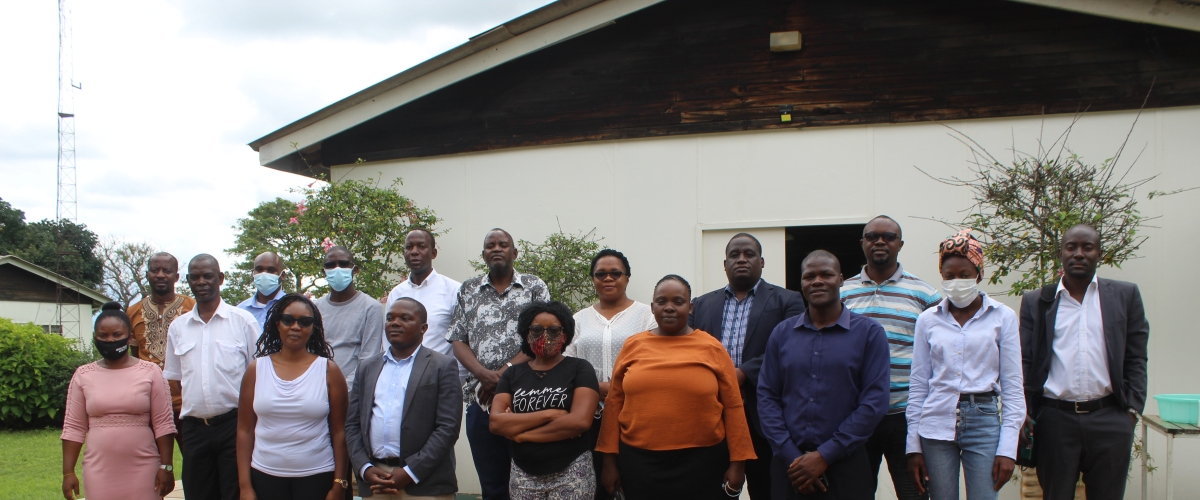
By Happy Mulolani
The need to enhance data capture is key if Zambia is to progress on an upward trajectory to contribute to the research and development of the agriculture sector.
One of the concerns is to have a multisectoral system with respect to how data is captured and shared to various stakeholders and players.
For this reason, the Centre for Coordination of Agricultural Research and Development for Southern Africa (CCARDESA) is implementing a CAADPX4 Programme which is funded by the European Union (EU) and administered by International Fund for Agricultural Development (IFAD). It is implemented in collaboration with African Forum for Agricultural Advisory Services in East and Central Africa (ASARECA), the West and Central African Council for Agricultural Research and Development (CORAF) and Forum for Agricultural Research in Africa (FARA).
One of the programmes output areas is the development of knowledge management strategies and data capture guidelines that will facilitate the collection of data to meet the Malabo national commitments. To facilitate the effective implementation of information, communication management (ICKM), a national consultative workshop of key stakeholders involved in data capture across government ministries was recently held in Chisamba, Zambia.
The purpose of the meeting was for CCARDESA to learn and draw lessons from national stakeholders on how organizations in Zambia collect Malabo commitments data which is reported in the CAADP-XP4 Biennial report.
CCARDESA Consultant Dr Fally Masambuka and Dr Stephen Opiyo highlighted the need to tackle the bottlenecks that exist in the current data capture processes. The duo observed that the National Agricultural Information Services (NAIS) has been instrumental in disseminating agriculture information to farmers and stakeholders, but more effort needs to be deployed to ensure that it is done in a more focused and coordinated manner.
The consultants remarked that there is a lack of institutional support, which has affected information sharing. Most reports shared tended to focus on project activities without linking them to the Malabo Declaration. They also emphasized the need for critical monitoring and evaluation which clearly defines data ownership, its users including their data needs.
They disclosed that one of the objectives of the assignment was to create a meaningful environment where data capture and knowledge management in the country is enhanced among various stakeholders in line with Sustainable Development Goals (SDGs) and Malabo declaration. This would require the establishment of a functional and user-focused data capture system which is currently a dream in a pipeline.
One of the participants, Natasha Mhango, a communication specialist observed a lack of expert views on topical issues as one of the major problems affecting data capture. She stressed that this not only slows down the process but also affects the quality of reports shared because they are inconsistent and usually have outdated information.
It was also noted that the national agriculture policy is key to boosting the key issues of data capture and the importance of promoting disclosure of public information within government ministries and beyond.
While data capture is a matter of concern, the trend shows that since the Malabo Declaration and CAADP (Comprehensive Africa Agriculture Development Programme) was initiated, few countries were performing fairly well up to 2019 and only Rwanda has been consistent.
Chief Agricultural Economist, Christopher Mbewe, said that the intention is to have a CAADP Champion who can influence decisions by interacting with politicians and other influential people on the potential benefits of enhancing agriculture development.
This is premised on the understanding and the need for political will to existing programmes of such a magnitude that require government support are to be actualized and succeed in the implementation of a knowledge management and data capture strategy.
Mr Mbewe explained that some people think CAADP is a project probably because of the way it was initiated. He observed that the progress in achieving the Malabo Declaration had been on a downward spiral due to a lack of support systems that promote data capture hence the need to develop a data capture system. Suffice to state that the Malabo Declaration underscores the CAADP implementation as a national responsibility. CAADP is an African- led agenda initiative conceptualized to guide Africa’s agricultural transformation for sustained food security and socio-economic growth.
Mr Stephen Chundama from the Zambia Development Agency noted that Zambia had no data protection policy, coupled with limited capacity to analyze data. He also pointed out the need to strengthen governance structures including dismantling silos in existing structures for a more efficient system.
At the end of the meeting, it was clear beyond any reasonable doubt that Zambia needed an integrated data capture system that will strengthen its data collection processes for them to meet the Malabo commitments.
The author is a Principal Agricultural Information Officer at the National Agriculture Information Service (NAIS)






